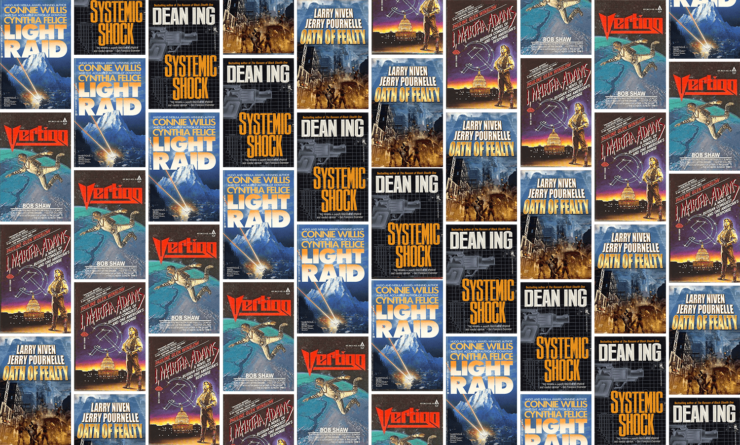Canada! Perhaps best known to fans of British soap operas, for whom it serves as that mysterious land to the west to which characters vanish after their purpose on the show has been served. Of course, all that is needed to learn far more about Canada than you would ever need or want to know is to get trapped in a conversation with a Canadian, uninvited exposition concerning their homeland being as natural to the average Canadian as it is any given inhabitant of a fictional utopia confronted by a woken sleeper from the pre-utopian past.
One might reasonably expect that most SF touching on Canada was written by Canadians and the Canadian-adjacent. Perhaps it is. Quite a lot of it is not. Here are five examples of Canada and Canadians in science fiction, as seen by foreign eyes.
Vertigo by Bob Shaw (UK) (1978)
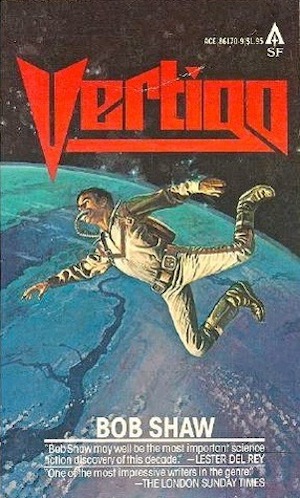
Contragravity gave humanity cheap, personal flight. This was a terrible idea. A casualty of the endless struggle to force fliers to conform to rudimentary safety rules, British Air Patrolman Rob Hasson is sent off to Tripletree, Alberta to convalesce from workplace injuries…and also to keep him safe from English gangsters until he can testify in an upcoming trial.
At first glance, Tripletree seems an unpromising rustic community innocent of civilized amenities, populated by dullards and lackwits. In fact, it’s worse. Rob soon discovers the Tripletree’s principle entertainment is vicious bullying and endless feuds. None of these should be the convalescing Air Patrolman’s problem, but of course they soon are.
Most of the authors whose work I will mention do not appear to have extensive (in some cases, any) personal exposure to Canada. It is probably not coincidental that most of the really noteworthy examples that came to mind predated the World Wide Web and easily accessed online research materials. Shaw is a notable exception, in this respect. Shaw briefly lived and worked in Canada. Vertigo presumably draws on that experience, which is why it’s a bit distressing that with one or two exceptions, Tripletree is populated almost entirely by hapless ninnies and smirking brutes.
***
Oath of Fealty by Larry Niven (USA), Jerry Pournelle (USA) (1981)
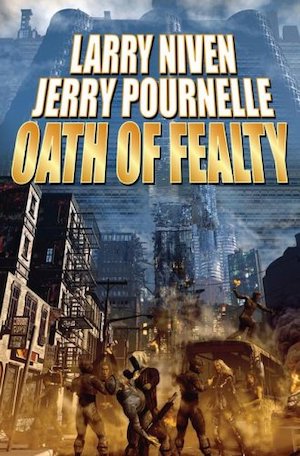
Todos Santos is an arcology, a 1000-foot-tall city/building erected in the ruins of a riot-leveled section of Los Angeles. A shining example of success—in fact, the only successful arcology to date—one might expect the community to be revered as an example to emulate by the rest of L.A. Instead, the insular arcology and its host city have a relationship best described as mutually hostile. Todos Santos’ situation becomes even more fraught when the community is targeted by terrorists.
But where are the Canadians, you ask? Oath of Fealty adopts one trope from utopian tales: the outsider to whom the realities of daily life in Todos Santos can be explained at length. That role falls to Sir George Reedy, Deputy Minister for Internal Development and Urban Affairs, Dominion of Canada. Alas, that “Sir” immediately suggests unfamiliarity on the part of the authors with the 1919 Nickle Resolution (reaffirmed in 1968), which directed that Canadians no longer be bestowed with foreign titles. Non-Canadians who might doubt just how firm Canada is on this point need only ask Conrad Black, Lord Black of Crossharbour, what it took for him to acquire a title.
***
Systemic Shock by Dean Ing (USA) (1981)
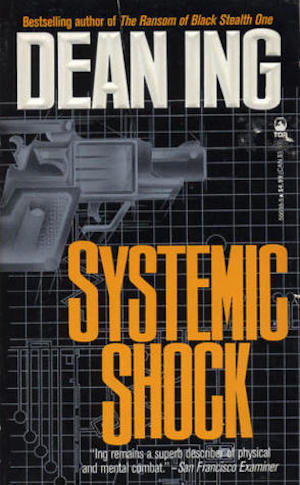
1985’s World War Three reshaped the world order but managed—somehow—to avoid a full-blown nuclear exchange. 1996’s World War Four addressed this oversight, as a series of unfortunate decisions catapult the Allies (North America, Europe, and Russia, plus a handful of others) and SinoInd (an alliance of southerly nations reaching from Brazil to India and China) into a global thermonuclear exchange. Youngster Ted Quantrill survived nuclear war and the plagues that followed. His talent for killing made him a critical resource for a fractured America determined to prevail.
Canada plays an indirect but important role in Quantrill’s new circumstances. Although Canada’s small population is highly urbanized, thus extremely vulnerable to nuclear annihilation, Ing’s Canada is one of the major post-war powers in this novel. Somehow. Although near-certain almost total depopulation and a shattered industrial base would seem insurmountable impediments to martial prowess, Ing’s version of Canada prevails to confound our enemies and annex the northern third of the US. For said annexed territory’s own good, of course.
***
I, Martha Adams by Pauline Glen Winslow (UK) (1982)
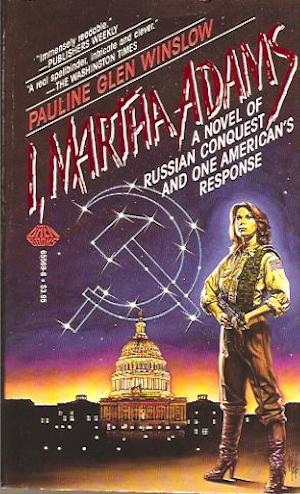
Thanks to President Carmody’s neglect of Reagan’s defense programs, Soviet missiles launched from Panama and Cuba annihilate America’s nuclear arsenal. Americans may now look forward to comprehensive restructuring—another term for rampant looting—as the defeated nation is integrated into the glorious socialist world order. Or rather, they could, if were it not for the fact that thanks to certain documents left by her late defense contractor husband, patriot Martha Adams is on the track of a nuclear superweapon powerful enough to drive the Red Menace from American shores.
Not to belabour the point but one might expect that since Canada has fewer people than some major cities, the dastardly Reds would have collected us along with the Americans. Not so, for a rather curious reason. The Reds, or at least Winslow’s Reds, reject possession of Canada as too Asiatic…to quote the novel:
New reports of huge numbers of Chinese agents and saboteurs at large in the Canadian population now infuriated him, especially since up until recent years it would have been impossible for this to have happened. Any Oriental in British or French Canada had been conspicuous. Then that fool of a Prime Minister had filled the nation with so many Orientals that it was beyond the resources of any intelligence service to check each and every one.
While it’s true Canada was far more diverse by the 1980s than it had been, it didn’t take much to qualify as “far more diverse.” Even today, decades after Canada’s federal government rejected its traditional [note to self: find a nice way to phrase “incredibly racist”] standards to sieve potential immigrants, Asian Canadians are but a small fraction of the population, and that fraction was even smaller in 1984. Still, while unconstrained by factuality, Winslow’s bold take on Canada is a change from the more typical (and not entirely inaccurate, at least before 1970) perception of Canada as a continent-wide Sundown town.
***
Light Raid by Connie Willis (USA) and Cynthia Felice (USA) (1989)
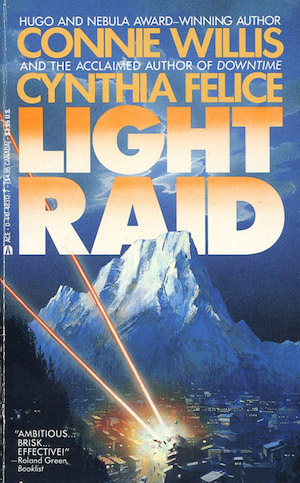
Life in war-torn North America is stressful. Being evacuated from Denver to neutral Victoria is traumatic for young Ariadne; as is so often true, evacuees are seen less as unfortunates to help and more as resources to exploit. Ariadne has it worse than most, because her father is a useless drunk, while her mother is accused of treason. What can poor Ariadne, protagonist of a book calculated to appeal to readers her age, possibly hope to do that will make a difference for her, her family, or her nation?
This North America of tomorrow has been comprehensively reshuffled. Canada in its current form does not exist. That said, not only does our heroine find herself in what is currently British Columbia, but the major antagonist in this novel is Quebec. And what a Quebec! Neither possessed of a vast population or prodigious birthrate, Quebec is outnumbered about 45:1 by the populations of the rest of Canada and the United States. Nor do current birthrates suggest that the situation will change in Quebec’s favour. Nevertheless, this Quebec of Tomorrow is able to hold its own in the face of far larger nations. Willis and Felice’s faith in Quebec’s prowess is inspiring.
***
Of course, this is hardly a comprehensive list. Feel free to mention other noteworthy examples in the comments below.
In the words of Wikipedia editor TexasAndroid, prolific book reviewer and perennial Darwin Award nominee James Davis Nicoll is of “questionable notability.” His work has appeared in Publishers Weekly and Romantic Times as well as on his own websites, James Nicoll Reviews and Young People Read Old SFF(where he is assisted by editor Karen Lofstrom and web person Adrienne L. Travis). He is a four-time finalist for the Best Fan Writer Hugo Award and is surprisingly flammable.










